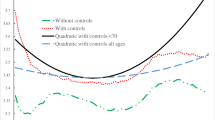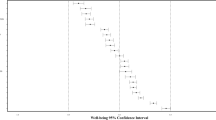Abstract
The 2008 financial crisis hit the world’s economies in different ways. In Spain, the economic crisis has had an acute effect on unemployment and access to education, aggravated by the austerity plans of the Spanish government. In order to cope with the crisis, the government′s efforts have aimed to control public deficit and stabilize financial markets, rather than to directly support citizens’ wellbeing. This paper studies the relationship between unemployment, education, income and subjective wellbeing (SWB) in the city of Granada, one of the most negatively affected by the crisis, using representative household data for 2012. We approach SWB from three different but interrelated angles through answers to questions on life satisfaction, financial satisfaction and material needs satisfaction. Results reveal that in this context of crisis and high levels of unemployment, higher education and employment status are still strong determinants of SWB but that income has a weak and non-robust relationship with SWB, except in the case of satisfying material needs. In addition, the unemployment levels of the same age-group are also negatively linked with people’s SWB, contrary to what we would expect from previous literature predicting a positive impact of having others around experiencing the same precarious situation. Thus, our results suggest that in Spain, policies to address the effects of the crisis should strengthen their focus on providing employment opportunities and keeping people in education rather than cutting public spending to meet the needs of the financial markets.
Similar content being viewed by others
Notes
The original questions and answers in Spanish are as follows: ¿Está usted satisfecha/o con su vida en general? (1) Muy satisfecha/o, (2) Satisfecha/o, (3) Normal, (4) Insatisfecha/o, (5) Muy insatisfecha/o, (6) NS/NC; ¿Está usted satisfecha/o con la renta que gana/n? (1) Muy satisfecha/o, (2) Satisfecha/o, (3) Normal, (4) Insatisfecha/o, (5) Muy insatisfecha/o, (6) NS/NC; En su opinión, con la renta de la que dispone/n en su hogar… (1) Se satisfacen holgadamente las necesidades, (2) Llega justo pero se satisfacen las necesidades, (3) Falta un poco para satisfacer las necesidades, (4) Falta mucho para satisfacer las necesidades, (5) NS/NC.
The different options were self-employed, employee, unemployed, retired, student, homemaker and others.
Even though VIF indicates that there is no problem of multicollinearity, we estimate different models introducing the variables sequentially. We are especially concerned by the possible influences between income, education and unemployment. However, the results are robust to adding or deleting variables in all models considering each dependent variable.
The Consejo General del Poder Judicial is an autonomous and constitutional institution whose main duty is to guarantee the independence of judges in their functions.
References
BOE. (2011). Real Decreto 1888/2011, de 30 de diciembre, por el que se fija el salario mínimo interprofesional para 2012. Boletín Oficial del Estado, 315, 146680–146682.
BOE. (2012). Ley 3/2012, de 6 de julio, de medidas urgentes para la reforma del mercado laboral. Boletín Oficial del Estado, 162, 49113–49191.
Cameron, A. C., & Trivedi, P. K. (2009). Microeconometrics using stata. Texas: Stata Press.
Cantril, H. (1965). The patters of human concern. New Brunswich: Rutgers University Press.
Carballo-Cruz, F. (2011). Causes and consequences of the Spanish economic crisis: Why the recovery is taken so long? Panoeconomicus, 3, 309–328.
Caritas. (2012). De la coyuntura a la estructura: los efectos permanentes de la crisis. VII Informe del Observatorio de la Realidad Social. Madrid: Cáritas Española.
CEOE. (2013). Situación socioeconómica. Informe Mensual 1. Madrid: Confederación Española de Organizaciones Empresariales. http://www.ceoe.es/resources/image/sse_2013_01.pdf.
CIS (2013). Banco de datos. http://www.cis.es/cis/opencms/ES/2_bancodatos/. Accessed January 24, 2013.
Clark, A. E. (2003). Unemployment as a social norm: Psychological evidence from panel data. Journal of Labor Economics, 21(2), 289–322.
Clark, A., Frijters, P., & Shileds, M. A. (2008). Relative income, happiness, and utility: An explanation for the Easterlin paradox and other puzzles. Journal of Economic Literature, 46(1), 95–144.
Clark, A. E., & Oswald, A. J. (1994). Unhappiness and unemployment. Economic Journal, 104, 648–659.
Deaton, A. (2012). The financial crisis and the well-beings of Americans. Oxford Economic Papers, 64, 1–26.
Easterlin, R., Angelescu, L., Switek, M., Sawangfa, O., & Smith, J. (2010). The happiness–income paradox revisited. Proceedings of the National Academy of Sciences of the United States of America, 107(52), 22463–22468.
Eurobarometer (2013) Eurobarometer interactive search system. http://ec.europa.eu/public_opinion/cf/index_en.cfm. Accessed January 5 2013.
Eurostat, (2013a). Employment and unemployment statistics. http://epp.eurostat.ec.europa.eu/portal/page/portal/employment_unemployment_lfs/introduction. Accessed January 24, 2013.
Eurostat, (2013b). Income distribution statistics. http://epp.eurostat.ec.europa.eu/statistics_explained/index.php/Income_distribution_statistics. Accessed January 24, 2013.
Fafchamps, M., & Shilpi, F. (2006). Subjective welfare, isolation and relative consumption. CEPR Discussion Paper 6002. SSRN: http://ssrn.com/abstract=976748. Accessed February 25, 2013.
Frey, B. S., & Stutzer, A. (2002). Happiness and economics. Princeton: Princeton University Press.
Graham, (2010). Happiness around the world. Oxford: Oxford University Press.
Graham, C., Chattioadgyay, S., & Picon, M. (2010). The Easterlin and other paradoxes: Why both sides of the debate might be correct. In E. Dieder, J. Helliwell, & D. Kahneman (Eds.), International differences in well-being. Oxford: Oxford University Press.
Graham, C., & Felton, A. (2006). Inequality and happiness: Insights from Latin America. Journal of Economic Inequality, 4, 107–122.
Gudmundsdottir, D. G. (2013). The impact of economic crisis on happiness. Social Indicators Research, 110, 1083–1101.
Guillen-Royo, M. (2011). Reference group consumption and the subjective wellbeing of the poor in Peru. Journal of Economic Psychology, 32(2), 259–272.
Helliwell J., & Huang H. (2011). New measures of the costs of unemployment: evidence from the subjective well-being of 2.3 million Americans. Working Paper 16829, NBER.
Helliwell, J., Layard, R., & Sachs, J. (Eds.). (2012). World happiness report. New York: Earth Institute, Columbia University.
INE. (2013). INEBASE. http://www.ine.es/inebmenu/indice.htm. Accessed January 25, 2013.
Kahneman, D., & Deaton, A. (2010). High income improves evaluation of life but not emotional well-being. Proceedings of the National Academy of Sciences, 107, 16489–16493.
Kingdon, G. G., & Knight, J. (2007). Community, comparisons and subjective well-being in a divided society. Journal of Economic Behaviour and Organisation, 64, 69–90.
McBride, M. (2001). Relative-income effects on subjective well-being in the cross-section. Journal of Economic Behaviour and Organization, 45, 251–278.
Ministerio de Hacienda y Administraciones Públicas, 2013. Presupuestos generales del estado. http://www.minhap.gob.es/es-ES/Areas%20Tematicas/Presupuestos%20Generales%20del%20Estado/Paginas/Presupuestos.aspx. Accessed January 24, 2013.
Mochón, F., & Ahn, N. (2007) La felicidad de los españoles: Factores explicativos. Documentos de Trabajo FEDEA 2007-12. http://www.fedea.es/pub/papers/2007/dt2007-12.pdf.
United Nations. (2012). Examen de los informes presentados por los Estados partes en virtud de los artículos 16 y 17 del Pacto. Economic, Social and Cultural Rights Committee. 48° session period. May 18, 2012.
Van Praag, B. M. S., & Ferrer-i-Carbonell, A. (2004). Happiness quantified. A satisfaction calculus approach. Oxford: Oxford University Press.
Veenhoven, R. (2007). Happiness in hardship. In L. P. Bruni & P. L. Porta (Eds.), Economics and happiness (pp. 243–266). Oxford: Oxford University Press.
Walsh, B. (2011). Well-being and economic conditions in Ireland. UCD Centre for Economic Research Working Paper Series 11, 27. http://www.ucd.ie/t4cms/WP11_27.pdf. Accessed February 25, 2013.
Zarzosa, P., & Somarriba, N. (2013). An assessment of social welfare in Spain: Territorial analysis using a synthetic welfare indicator. Social Indicators Research, 111, 1–23.
Acknowledgments
The authors would like to thank Francisco González Gómez, Miguel A. García Rubio, José María Tortosa, Mariano Rojas, Luis Ayala as well as two anonymous referees for their useful comments. Financial support from the Spanish Ministry of Economics and Competitiveness (Project ECO2009-08824/ECON and Project ECO2012-32189), the Government of Andalucía (Project P11-SEJ-7039) and Instituto de Estudios Fiscales (Project C-3929-00) is acknowledged.
Author information
Authors and Affiliations
Corresponding author
Rights and permissions
About this article
Cite this article
Guardiola, J., Guillen-Royo, M. Income, Unemployment, Higher Education and Wellbeing in Times of Economic Crisis: Evidence from Granada (Spain). Soc Indic Res 120, 395–409 (2015). https://doi.org/10.1007/s11205-014-0598-6
Accepted:
Published:
Issue Date:
DOI: https://doi.org/10.1007/s11205-014-0598-6




